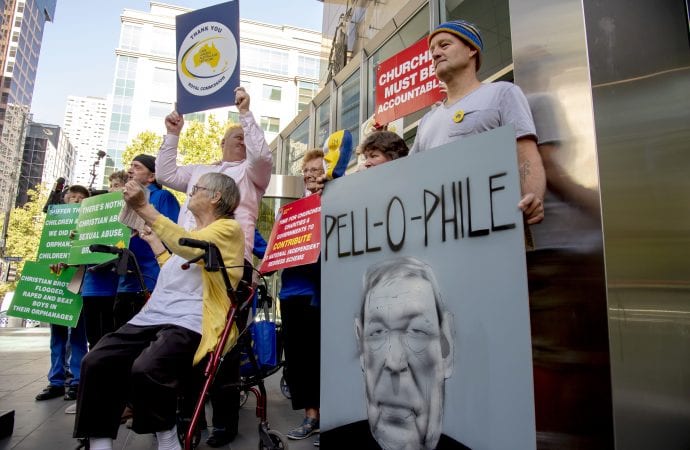Will Pell Be Abuse Crisisís Eichmann, Count of Monte Cristo or Rosenbergs?
By John L. Allen Jr.
In early June, Cardinal George Pell of Australia will have a hearing before the Supreme Court of Victoria regarding his appeal of a conviction for sexually abusing two minor altar boys in the 1990s, for which he was sentenced Wednesday morning local time to 6 years in prison with the possibility of parole after half that time is served. While many uncertainties remain about the Pell case, at the level of public perceptions perhaps the greatest is this: Is the 77-year-old prelate destined to become the Adolf Eichmann, the Count of Monte Cristo, or the Rosenbergs of the clerical abuse scandals? Respectively, those figures have passed into history as leading symbols of the following possibilities vis-a-vis criminal justice: A truly guilty person who got exactly what he deserved, regardless of whatever concerns might surround the legal fine points of his conviction. The most celebrated case of wrongful conviction in all of literature. Someone whose innocence or guilt remained a point of dispute long after the legal process ended, with opinions usually based more on someoneís politics than the evidence. (The Rosenbergs were executed in 1953 on charges of passing American nuclear secrets to the Soviets.) At this stage all three outcomes seem at least theoretically plausible, but the Rosenberg option may be the most likely. Despite the sentence announced Wednesday morning in Melbourne, Pell maintains his innocence. His June 5-6 appeal hearing comes remarkably early by Australian standards, and the fast-track treatment could suggest concern among at least some of the justices about his conviction. Legal experts in Australia say thereís a decent chance Pellís new legal team could meet the statutory standard of ďreasonablenessĒ to justify an appeal. Itís important to remember that the first group of 12 Australians who examined the evidence against Pell back in August couldnít reach a conclusion, with that trial ending in a hung jury and, at least reportedly, a majority ready to acquit. A second jury voted unanimously to convict, leaving it unclear how to explain the swing. Observers whoíve examined the charges against Pell have raised critical questions, including how a fully vested and robed archbishop could have performed the acts attributed to him in the sacristy of a busy cathedral on a Sunday. Australian Jesuit Father Frank Brennan has written that for the accuserís testimony to be persuasive, Pell would have had to open the liturgical alb he was wearing or somehow shove it aside, neither of which are really possible given its design. Police never inspected the vestments, Brennan points out, nor did the prosecution ever show that the vestments could be parted or moved. Presumably, these issues and others will figure in the appeal. If the Supreme Court sides with Pell, prosecutors could either try Pell for third time or to drop the charges, depending on their evaluation of the likelihood of success. In other words, the last word on the Pell saga hasnít yet been spoken. Itís possible that in examining the evidence in the appeal, the justices of the Victoria Supreme Court will reach the conclusion that theyíre sufficient to sustain Pellís conviction, and that their ruling will be expressed in such a way as to dispel reasonable doubt. In that case, most reasonable people would likely come to see Pell in a fashion similar to the way the world reacted to Eichmannís execution by Israel in 1962 for his role as a mastermind of the Holocaust - perhaps he didnít get the fairest trial in the history of jurisprudence, but for someone indisputably guilty of monstrous crimes, no one was going to lose much sleep over it. On the other hand, itís also possible that a review of the evidence will lead the justices to the opposite conclusion, that the testimony against Pell doesnít pass the ďsmell test.Ē His conviction could be set aside, and, assuming the basis for that decision is regarded as convincing, he could become the symbol of a churchman devastated by the impact of false charges fueled by a climate of hysteria. That, of course, is the Count of Monte Cristo option. (In Alexandre Dumasí celebrated novel, a man is falsely accused of treason and imprisoned without trial.) Probably the most likely result, however, is that regardless of how the Supreme Court rules, doubt will remain. If the appeal is denied, those convinced of Pellís innocence arenít terribly likely to change their minds - and if itís upheld, those convinced of his guilt probably would see it as a someone with means and influence beating the rap. In that case, Pell would become the Rosenbergs of the story. Julius and Ethel Rosenberg were Jewish-Americans convicted of spying for the Soviet Union in the late 1940s, allegedly passing on nuclear weapons designs at a time when the U.S. was the worldís only nuclear power. Though evidence discovered after the fall of the Berlin Wall now suggests Julius Rosenberg was indeed guilty of espionage and his wife, Ethel, probably was involved too, that wasnít at all clear at the time they were put to death. For decades afterwards, whether one regarded the Rosenbergs as falsely accused or rightly condemned had far more to do with the politics of the Cold War than a sober evaluation of the facts, and the case helped deepen those divisions. One can hope the Rosenberg option in Pellís case can still be avoided by a painstakingly careful review during the appeal process, followed by a judgment, whatever it may be, which is well-grounded enough to convince reasonable people. So far, however, such a definitive outcome seems hard to imagine - and Wednesdayís sentence, however dramatic, didnít by itself make such closure more likely.
|
.
Any original material on these pages is copyright © BishopAccountability.org 2004. Reproduce freely with attribution.
